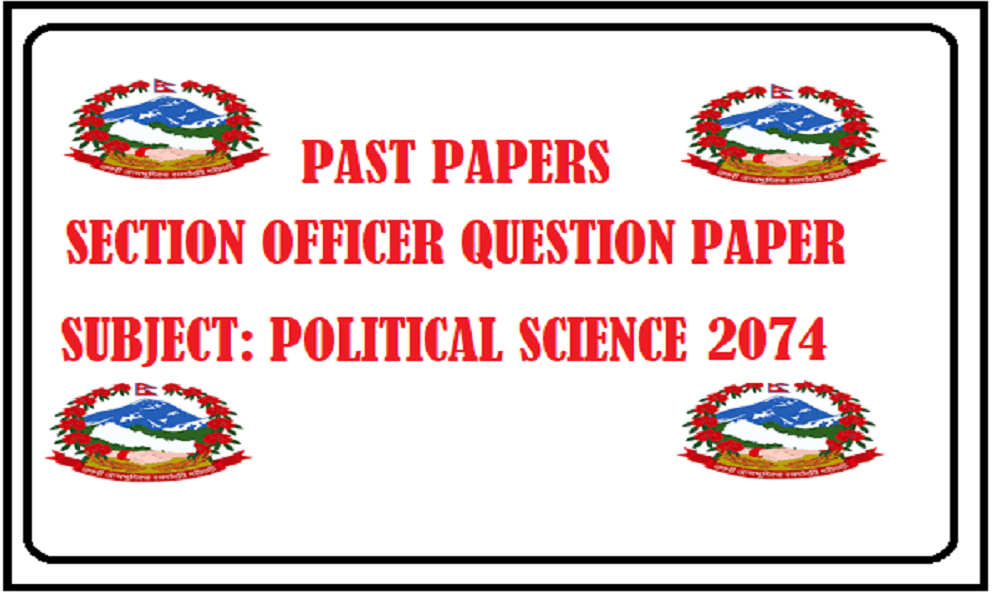PSC Section Officer Notes on the Topic Monopoly
PSC Section Officer Notes 2076 on the topic of Monopoly and Cartel is the effort the give you the notes in English language. This is the collection of notes of the fourth paper of section officer of Contemporary Issues. The main objective of this collection is to provide you the easy notes for your better preparation. PSC Section Officer notes will definitely help you for your exam.
Monopoly:
The monopoly is derived from the Greek word meaning ‘single seller’. When there is a single firm producing a good or service for the entire market, it is called a pure monopoly. The firm is therefore the entire industry. In the real world, a monopolistic industry may consist of one firm that dominates the market with a very large market share. For example, DeBeers company of South Africa controls over 80% of diamond sales, and is considered to be a monopoly.
The model of monopoly rests on the following assumptions:
1. There is a single seller or dominant firm in the market.
2. There are no close substitutes. If substitute goods existed, then consumers could easily switch to buying a substitute good. In which case there would no longer be a monopoly for the good in question. Therefore, the monopolist produces a good or service that has no close substitutes.
3.There are significant barriers to entry. The monopolist owes its dominance in the market and the absence of competitor firms partly to be inability of other firms to enter the industry. Anything that prevents other firms from entering the industry is called a barrier to entry. Monopoly lies at the opposite extreme of market structures to perfect competition.
4. As a single seller, the monopolist faces no competition from other firms and it has substantial market power (the ability to control price)
Characteristics
Profit maximizer: Maximizes profits.
Price Maker: Decides the price of the good or product to be sold, but does so by determining the quantity in order to demand the price desired by the firm.
High Barriers: Other sellers are unable to enter the market of the monopoly.
Single seller: In a monopoly, there is one seller of the good that produces all the output. Therefore, the whole market is being served by a single company, and for practical purposes, the company is the same as the industry.
Price Discrimination: A monopolist can change the price and quality of the product. He or she sells higher quantities, charging a lower price for the product, in a very elastic market and sells lower quantities, charging a higher price, ina less elastic market.
Cartel is the emerging trend of monopoly. There may be many industries and businesses that might produce and distrubute the similar types of goods and services, avoiding the perfect competition, these producers combine or join together and decide and control the price in the market.
Cartel:
A cartel is a formal agreement between firms in an industry to take actions to limit competition in order to increase profits, it is therefore involves formal collusion ( or open collusion).
The agreement may involve limiting and fixing the quantity to be produced by each, when result in
1. An increase in price.
2. Fixing the price at which output can be sold.
3. Setting restrictions on non-price competition (such as adertising).
4. Dividing the market according to geographical or other factors
5. Agreeing to set up barriers to entry.
Whatever the case, the objective is to limit competition, increase the monopoly power of the firms, and increase profits. The key objective or a cartel is to limit competition between the member firms and attempt to maximize joint profits. Cartel members collectively behave like a monopoly.
Cartel practices in Nepal:
1.Transportation businesses avoid free competition, join together or make a consenus to use the old buses, allocate high fares, etc.
2. Truck businesses syndicate to use the old trucks.
3. When there is decrease in price of goods, then people close their shops, hide gold and silver, and only when there is increase in prices, such goods are taken out.
4. Suger is hidden and sold in black when market situation shows that there will be shortage.
5. The petroleum suppliers from associations, demand high commission, close the supply and with the help of dialogues and negotiations, prices for supply are increased.
Suggestions to minimize cartel:
1. Prompt implementation of laws.
2. Legal punishment for those who set up monopoly, black market.
3. Pressure from the consumers for the protection of their rights.
4. Monitoring of markets regularly.
5. Prompt response on notice and cases against wrong activities related to suppress free market.
6. Enhance the capacity of regulatory institutions.
Provision against monopoly and cartel in Competition Promotion and Market Protection Action, 2063
Prohibition on anti-competitive agreements:
No person or enterprise that produces or distributes any goods or services shall, with an intention to limit or control competition, enter into, or cause to be entered into individually or collectively, any agreement with any other person or enterprise that produces the identical or similar goods or services.
Prohibition on abuse of dominant position:
No enterprise holding dominant position shall abuse or cause to be abuse, such position with intent to control competition in the production and distribution of any goods by that enterprise or through its affiliation.
Prohibition on merger or amalgamation with intent to control competition:
No enterprise that produces or distributes any goods or services shall, with intent to maintain monopoly or restrictive trade practices in the market, merge or amalgamate with another enterprise that produces or distributes the similar or identical goods or services or purchase; wither singly or jointly with its subsidiary enterprise, fifty percent or more of the shares of such enterprise or take over the business of such enterprise.
Prohibition on bid rigging:
No bidder submitting tender in response to an invitation to tinder made by an entity publicly shall not commit bid rigging.
Prohibition on market restriction:
No person or enterprise that produces or distributes any goods or services shall do, or cause to be done, any transaction in such a manner as to restrict the market of the production or distribution of such goods or services.
Prohibition on tied selling:
No person or enterprise that sells any goods or services shall engage in tied selling.
Prohibition on misleading advertisement:
No person or enterprise that produces or distributes any goods or services shall do, or cause to be done, any misleading advertisement with intent to control or limit competition.


